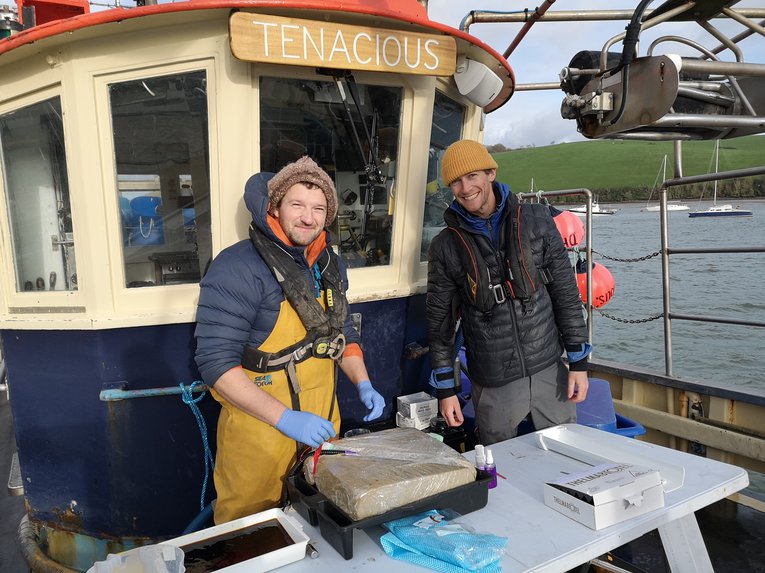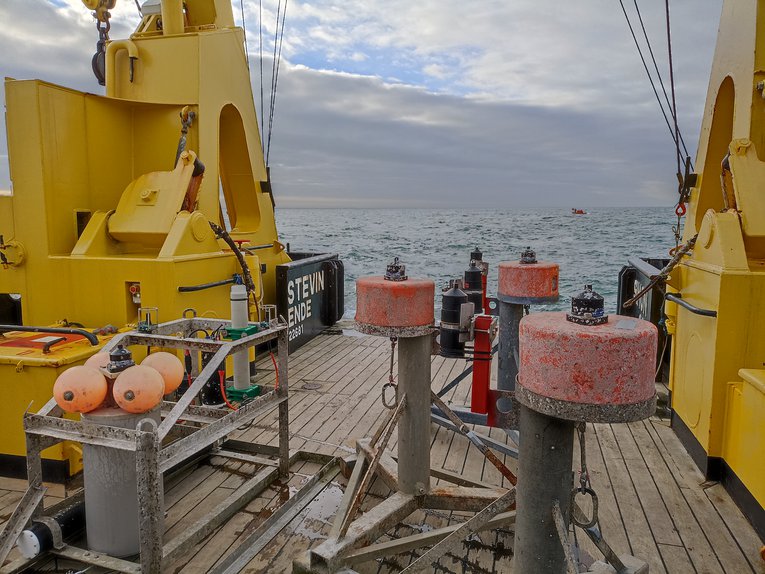
Fish INTEL: February 2022 update
Calm weather conditions at the start of the year have helped our project partners push on with their field work, including setting up new acoustic devices and tagging more fish.

Bass and pollack in UK waters
The Fish INTEL team, led by Dr Tom Stamp from University of Plymouth, have been implanting bass with acoustic tags in the Salcombe Estuary and off the Plymouth coast. Ten pollock have also been successfully tagged. These are the first 10 pollock ever to be fitted with acoustic tags.
Tracking the geographic movement patterns of these fish will allow us to monitor their behaviour and make a long-term assessment for their recovery. Such movements can be recorded at any of our 'listening stations' in the ever growing network of receivers along the Channel.

Pollack tagging in Devon
Credit: Dr Tom Stamp, University of Plymouth

Tom and Pete tagging bass in Salcombe
Credit: Dr Tom Stamp, University of Plymouth
Tuna in Jersey
Bluefin tuna disappeared from UK waters over the last 50 years or so, but they have recently returned – the first having been spotted off Jersey in 2016.
Last summer, 29 tuna were tagged off the coast of Cornwall. So far this year, our University of Exeter partners have caught and tagged seven bluefin tuna in Jersey (outside the FISH INTEL project location) to provide further details of the distribution of the species, and how frequently they move across the English Channel.
There are 12 acoustic (‘listening’) stations in Channel Islands waters that will work with the 10 sites that are specifically located in English coastal waters to record tuna activity. These are dotted along the south Cornish coast from Mounts Bay to the Eddystone Lighthouse.

Current map of acoustic arrays deployed throughout the project area. Sussex is having 9 receivers placed in coastal waters in March. All receivers will track all species tagged in the project. Data loggers have to be collected, downloaded, and redeployed quite frequently (about once every 3 months).
Credit: Interreg
Assessing habitats and current protections
As part of the Fish INTEL project, our partners IFREMER (the French government marine research institute) and the University of Plymouth are leading a study into habitat use and vulnerability from human activities for the species we are researching. This will help us understand what management measures would be useful for the species we are studying.
We’ll be investigating:
- Specific features and habitats that need protecting or regulating because of the species that live there (e.g. windfarms, wrecks, estuary mouths, muds, sands, gravels, reefs and living reefs)
- Specific seasons/months where management is needed to protect a particular species (e.g. when crawfish migrate into deeper water to spawn in winter, when bluefin tuna arrive in UK waters in late summer to winter; when juvenile bass use estuaries and shallower coastal UK waters as nursery grounds).
- How well current regulations are facilitating protection of key habitats for the Fish INTEL species (e.g. angling restrictions on bass, fixed-engine bans in estuaries, full or partial restrictions on vulnerable species such as bluefin tuna).

Acoustic receivers being recovered, data collected, and redeployed off the Belgian coast by our partners, VLIZ
Credit: Jan Ruebens, Flanders Marine Institute (VLIZ)

RV Simon Steven sailing in Belwind windfarm, off the Belgian coast
Credit: Jan Ruebens, Flanders Marine Institute (VLIZ)
Other news
- There is an Marine Protected Areas meeting where we will introduce Fish INTEL aspects of collaborative research on 22-23 March 2022 in La Rochelle. The Marine Conservation Society will be presenting, as will the University of Plymouth.
- Our partners at VLIZ in Belgium have deployed 12 acoustic receivers in windfarm sites off the coast.
- All partners will be meeting in Brittany at the end of March at an IFREMER facility.
- The next project newsletter will be launched at end of April 2022.
Fish INTEL is led by the University of Plymouth and funded by the Interreg Channel and European Regional Development Fund. Acoustic tagging in Sussex is supported by FISH INTEL, Sussex Wildlife Trust, Pebble Trust, Sussex IFCA, Natural England and RS Aqua.


